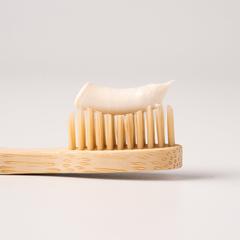The Natural Toothbrush: Getting Back to the Roots of Oral Care
Wiki Article
In a global increasingly dominated by high-tech gadgets and plastic everything, a quiet revolution takes us time for basics. Enter the natural toothbrush—a simple, sustainable, and time-tested approach to oral hygiene our ancestors would recognize. But precisely what is a 4pcs biodegradable oral care brushes, and is it a viable alternative to its modern, plastic counterpart?

Let's explore the roots with this growing trend.
What is often a Natural Toothbrush?
A "natural toothbrush" isn't a single product but a category that encompasses tools meant to clean teeth without artificial materials or complex engineering. The two primary forms are:
The Miswak (or Siwak): This could be the most well-known natural toothbrush. It is often a teeth-cleaning twig removed from the Arak tree (Salvadora persica). For thousands of years, cultures across the Middle East, Africa, and Asia have used miswak by fraying one end of the twig to create a brush-like bristle and taking advantage of it to scrub the teeth and gums.
Modern Bamboo Toothbrushes: A contemporary interpretation, these feature a biodegradable bamboo handle paired with bristles typically produced from castor bean oil (BPA-free nylon) or, less commonly, boar hair. They offer the familiar form factor of the plastic toothbrush however with a significantly reduced environmental footprint.
The Benefits of Going Natural
Why are people making the switch? The advantages are compelling, blending personal wellness with planetary health.
1. Environmental Sustainability
This may be the biggest driver. The American Dental Association estimates that over one billion plastic toothbrushes are thrown away annually in the United States alone. Each one usually takes over 400 years to decompose in a very landfill. Natural alternatives like bamboo brushes have handles which might be compostable and biodegradable, breaking down in the matter of months as opposed to centuries.
2. Proven Cleaning Power
Don't let their simplicity fool you. The miswak, specifically, continues to be studied extensively. Research has shown it contains natural compounds with potent antibacterial and anti-plaque properties. It's a natural source of:
Silica: A mild abrasive that helps scrub away stains and plaque.
Tannins: Have an astringent effect which can help protect gums.
Natural Fluoride: Helps strengthen tooth enamel and fight decay.
Antibacterial Essential Oils: Freshen breath and inhibit bacterial growth.
3. Portability and Convenience
A miswak stick will be the ultimate travel toothbrush. It requires no toothpaste, no water, no bulky case. You can carry it in your pocket or purse and freshen up anywhere through trimming the conclusion and chewing it to split up the fibers. It’s a self-contained oral hygiene kit.
4. A Connection to Tradition
Using an organic toothbrush just like the miswak is really a practice steeped ever sold and culture, with mentions in ancient texts and religious traditions. For many, it has a sense of link with a simpler, more mindful way of living.
Considerations and How to Use
While the huge benefits are clear, there are some things to take into account.
For the Miswak:
The Learning Curve: It feels distinctive from a standard brush as well as a specific technique. You moisten the stick, chew one end to soften it, and after that peel away the bark from that end. The exposed fibers become your "bristles."
Taste: It has a distinct, initially pungent, and slightly bitter taste that some should get used to.
Bristle Durability: The bristles wear out and need being trimmed every few days.
For Bamboo Toothbrushes:
The Bristle Dilemma: While the handle is biodegradable, most nylon bristles usually are not. You often need to pluck them out with pliers before composting the handle. Boar bristle options exist but usually are not vegan.
Moisture Management: Bamboo is an organic material and may split or mold if left constantly wet. It's important to store it in the dry, airy place.
Is a Natural Toothbrush Right for You?
Making the switch to a natural toothbrush is really a personal and powerful step toward a much more sustainable lifestyle. It’s a great choice for:
Eco-conscious individuals trying to reduce their plastic waste.
Travelers who want a lightweight, self-contained oral care solution.
Anyone thinking about holistic wellness and time-tested natural cures.
Whether you opt for the ancient wisdom from the miswak or perhaps the modern design of an bamboo brush, you're participating in a movement that values simplicity, sustainability, along with a cleaner planet—one smile during a period.